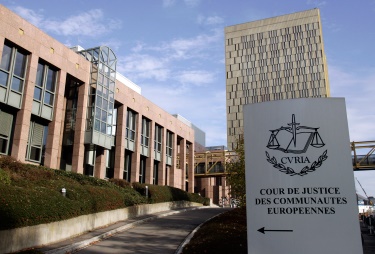In a judgment released today, the Court of Justice of the European Union has ruled that the Dublin III Regulation allows EU Member States to send an asylum seeker to a safe third country, irrespective of whether it is the Member State responsible for processing the application or another Member State.
 The case of Mirza v Bevándorlási és Állampolgársági Hivatal is currently only available in French and Hungarian at http://curia.europa.eu/juris/documents.jsf?num=C-695/15, though an earlier opinion by Advocate General Kokott is in English here (for EIN members).
The case of Mirza v Bevándorlási és Állampolgársági Hivatal is currently only available in French and Hungarian at http://curia.europa.eu/juris/documents.jsf?num=C-695/15, though an earlier opinion by Advocate General Kokott is in English here (for EIN members).
The case involved an asylum seeker from Pakistan who entered Hungary from Serbia and made an application for international protection. The Court's press release below gives further details:
_________________________________
Press and Information
Court of Justice of the European Union
PRESS RELEASE No 32/16
Luxembourg, 17 March 2016
Judgment in Case C-695/15 PPU
Shiraz Baig Mirza v Bevándorlási és Állampolgársági Hivatal
The Dublin III Regulation allows Member States to send an applicant for international protection to a safe third country, irrespective of whether it is the Member State responsible for processing the application or another Member State
That right may also be exercised by a Member State after it has accepted that it is responsible for processing the application pursuant to that regulation and within the context of the take back procedure
Mr Shiraz Baig Mirza, a Pakistani citizen, entered Hungarian territory illegally from Serbia in August 2015. On 7 August 2015, he made a first application for international protection in Hungary. During the procedure, Mr Mirza left the place of residence which had been assigned to him by the Hungarian authorities. By decision of 9 October 2015, the Hungarian authorities discontinued the examination of the application on the ground that the application had been implicitly withdrawn by the applicant.
Subsequently, Mr Mirza was taken in for questioning in the Czech Republic when he attempted to return to Austria. The Czech authorities asked Hungary to take him back, which Hungary agreed to do. Mr Mirza then submitted a second application for international protection in Hungary. On 19 November 2015, the Hungarian authorities rejected that application as inadmissible, without examining its substance. They considered that, for the applicant, Serbia had to be classified as a safe third country.
Mr Mirza brought an action against that decision before the Debreceni Közigazgatási és Munkaügyi Bíróság (Administrative and Labour Court of Debrecen, Hungary). That court has asked the Court of Justice whether Mr Mirza may be sent to a safe third country despite the fact that the Czech authorities appear not to have been informed of the Hungarian legislation and practice consisting in transferring applicants for international protection to safe third countries.
Since Mr Mirza is currently in detention, that case was dealt with under the urgent preliminary ruling procedure provided for in the Rules of Procedure of the Court.
By today's judgment, the Court observes, first of all, that the right to send an applicant for international protection to a safe third country may also be exercised by a Member State after that Member State has admitted to being responsible, pursuant to the Dublin III Regulation [1] and within the context of the take back procedure, for examining an application for international protection submitted by an applicant who left that Member State before a decision regarding the substance of his first application for international protection has been taken.
The Court then declares that, within the context of the procedure of taking back an applicant for international protection, the Dublin III Regulation does not subject the Member State responsible (Hungary) to an obligation to inform the Member State carrying out the transfer (the Czech Republic) of the wording of its national legislation on the sending of applicants to safe third countries or of its relevant administrative practice.
The Court also states that a lack of communication on those points between the two States concerned does not impair the applicant's right to an effective remedy against the transfer decision and against the decision on the application for international protection, as ensured by EU law.
Lastly, the Court rules that the right of the applicant for international protection to obtain, in a situation such as that in the present case, a final decision on his application, whether within the context of the procedure which was interrupted or within the context of a new procedure which does not have to be considered to be a subsequent application, does not deprive the Member State responsible of the possibility of declaring the application inadmissible or require it to resume the examination of the application at a specific procedural stage.
NOTE: A reference for a preliminary ruling allows the courts and tribunals of the Member States, in disputes which have been brought before them, to refer questions to the Court of Justice about the interpretation of EU law or the validity of an EU act. The Court of Justice does not decide the dispute itself. It is for the national court or tribunal to dispose of the case in accordance with the Court's decision, which is similarly binding on other national courts or tribunals before which a similar issue is raised.
Unofficial document for media use, not binding on the Court of Justice.
The full text of the judgment is published on the CURIA website on the day of delivery.
Press contact: Christopher Fretwell (+352) 4303 3355
Pictures of the delivery of the judgment are available from "Europe by Satellite" (+32) 2 2964106
[1] Regulation (EU) No 604/2013 of the European Parliament and of the Council of 26 June 2013 establishing the criteria and mechanisms for determining the Member State responsible for examining an application for international protection lodged in one of the Member States by a third-country national or a stateless person (OJ 2013 L 180, p. 31).